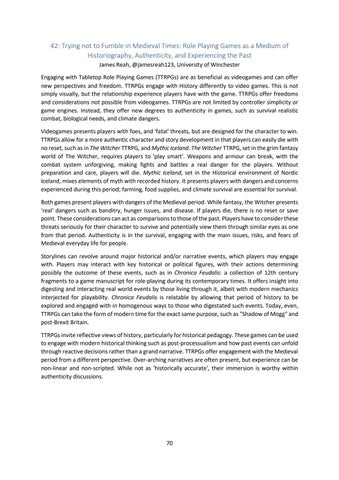42: Trying not to Fumble in Medieval Times: Role Playing Games as a Medium of Historiography, Authenticity, and Experiencing the Past James Reah, @jamesreah123, University of Winchester Engaging with Tabletop Role Playing Games (TTRPGs) are as beneficial as videogames and can offer new perspectives and freedom. TTRPGs engage with History differently to video games. This is not simply visually, but the relationship experience players have with the game. TTRPGs offer freedoms and considerations not possible from videogames. TTRPGs are not limited by controller simplicity or game engines. Instead, they offer new degrees to authenticity in games, such as survival realistic combat, biological needs, and climate dangers. Videogames presents players with foes, and 'fatal' threats, but are designed for the character to win. TTRPGs allow for a more authentic character and story development in that players can easily die with no reset, such as in The Witcher TTRPG, and Mythic Iceland. The Witcher TTRPG, set in the grim fantasy world of The Witcher, requires players to 'play smart'. Weapons and armour can break, with the combat system unforgiving, making fights and battles a real danger for the players. Without preparation and care, players will die. Mythic Iceland, set in the Historical environment of Nordic Iceland, mixes elements of myth with recorded history. It presents players with dangers and concerns experienced during this period; farming, food supplies, and climate survival are essential for survival. Both games present players with dangers of the Medieval period. While fantasy, the Witcher presents 'real' dangers such as banditry, hunger issues, and disease. If players die, there is no reset or save point. These considerations can act as comparisons to those of the past. Players have to consider these threats seriously for their character to survive and potentially view them through similar eyes as one from that period. Authenticity is in the survival, engaging with the main issues, risks, and fears of Medieval everyday life for people. Storylines can revolve around major historical and/or narrative events, which players may engage with. Players may interact with key historical or political figures, with their actions determining possibly the outcome of these events, such as in Chronica Feudalis: a collection of 12th century fragments to a game manuscript for role-playing during its contemporary times. It offers insight into digesting and interacting real world events by those living through it, albeit with modern mechanics interjected for playability. Chronica Feudalis is relatable by allowing that period of history to be explored and engaged with in homogenous ways to those who digestated such events. Today, even, TTRPGs can take the form of modern time for the exact same purpose, such as "Shadow of Mogg" and post-Brexit Britain. TTRPGs invite reflective views of history, particularly for historical pedagogy. These games can be used to engage with modern historical thinking such as post-processualism and how past events can unfold through reactive decisions rather than a grand narrative. TTRPGs offer engagement with the Medieval period from a different perspective. Over-arching narratives are often present, but experience can be non-linear and non-scripted. While not as 'historically accurate', their immersion is worthy within authenticity discussions.
70









